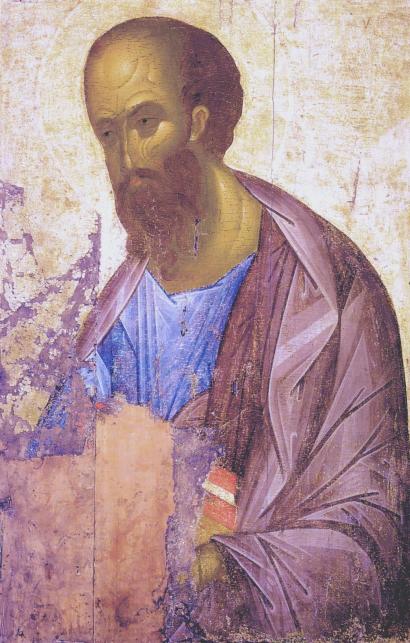Lenten Course Paul: Emmanuel Anglican Church, March 29, 2009
Paul before the Damascus Road experience:
Main Bible passages Gal 1.11-17; Phil 3.2-11; Acts 7.58-8.1, 9.1-9
Paul was a citizen of Tarsus (Acts 21.39) and of Rome (Acts 16.37); he was born a Roman citizen (Acts 22.28).
Paul was a Pharisee, which was an elite group of about 6000 men, highly trained in the Jewish law. He studied under Gamaliel (Acts 22.3), a leading Rabbi who sat on the Sanhedrin (Acts 5.34) who had an impudent disciple [b. Shabbat 30b]. In all likelihood then, Paul was a scribe, an expert in the law. In today’s term, Paul would have been a PhD; but not only that, he would eventually have become a “professor” in the European sense.
Saul was the persecutor in chief of the Christians. He did not take his mentor’s advice (Acts 5.34). He watched over and approved the illegal killing of Stephen (Acts 7-8). In the Roman empire, only a Roman governor could sentence someone to death. As a Roman citizen Saul knew this.
A Second cent desription of Paul reads (Acts of Paul III, 2-3):
A certain man named Onesiphorus, having heard that Paul was arriving in Iconium, went out with his sons, Semaia and Zenon, and with his wife, Lectra, to meet Paul to receive him into his home. For Titus had described to him Paul’s appearance, since he did not know him in the flesh but only in the spirit. He walked out to the Royal Road which leads to Lystra and he stood there waiting for Paul; he watched the people who were arriving, comparing them to Titus’ report. Now, he saw Paul coming, a man small in size, bald, bowlegged, vigorous, with joined eyebrows and a nose slightly aquiline, full of grace; for sometimes he appeared as a man, sometimes he had the face of an angel.
Paul writes, “Does not nature itself teach you that for a man to wear long hair is degrading to him , …” (1 Cor 11.14). Nature causes men’s hair to fall out. I asked Peter why he wears his hair so short, because when I first met him he had long hair. His response, now that he is in his forties, is that it doesn’t look good anymore.
Paul’s “Lenten experience”
Paul was blinded, a metaphor for his spiritual blindness. Only upon admission of blindness then a person can see (John 9).
Three days of absolute fasting (no food or water).
He would be prayed for by a prophet that God sent to him, Ananias; God would heal him from his blindness.
He would count everything in his former life as “shit” σκύβαλα (from the Greek word group from which we derive the word, “scatological”).
Paul after the Damascus Road experience:
After meeting Sergius Paulus, Saul becomes Paulus (means “small”, “diminutive”) in Latin (see Acts 13.7-13)
After Paul is introduced to the Jerusalem church he goes and stays in Tarsus for about 14 years. Barnabas retrieves him to help in the mission of Antioch. After that Paul travels with Barnabas, then later with Silas, and plants churches in Asia (modern Turkey), Greece and Macedonia. He boasted to the Corinthians about his suffering (2 Cor 11.21-29 ;RSV):
But whatever any one dares to boast of—I am speaking as a fool—I also dare to boast of that. 22 Are they Hebrews? So am I. Are they Israelites? So am I. Are they descendants of Abraham? So am I. 23 Are they servants of Christ? I am a better one—I am talking like a madman—with far greater labors, far more imprisonments, with countless beatings, and often near death. 24 Five times I have received at the hands of the Jews the forty lashes less one. 25 Three times I have been beaten with rods; once I was stoned. Three times I have been shipwrecked; a night and a day I have been adrift at sea; 26 on frequent journeys, in danger from rivers, danger from robbers, danger from my own people, danger from Gentiles, danger in the city, danger in the wilderness, danger at sea, danger from false brethren; 27 in toil and hardship, through many a sleepless night, in hunger and thirst, often without food, in cold and exposure. 28 And, apart from other things, there is the daily pressure upon me of my anxiety for all the churches. 29 Who is weak, and I am not weak? Who is made to fall, and I am not indignant?
He returns to Jerusalem is arrested, where he appeals to Caesar as was his right as a Roman citizen; and he travels to Rome as a prisoner, and stay two years in Rome under house arrest. After that the historical record becomes less clear. It is likely that he was released by Nero, traveled again to the East and was rearrested and died by beheading under Nero. See my post on Paul’s Martyrdom.
What is different after Paul’s Lenten Experience?
Paul is zealous for Jesus and the Gospel.
Before Paul was zealous for the traditions of his Fathers; now Paul puts the advancement of the Gospel before rules and traditions. Jews had rules about what to eat and with whom one could eat. Paul broke those rules in order to win people to Christ. At the same time, Paul would eat or drink nothing if it would offend a person, even though he knew we are free to eat or drink. His concern is still winning that person to Christ. (see 1 Cor 9.19f.). In Antioch Paul rebuked Peter over withdrawing from eating with Gentiles (Galatians 2), because some from James had come. Why? Because his vision was not that there would be two churches: one Jews where people were justified by works of the law (sabbath keeping, circumcision, keeping holy days); one of Gentiles where the Jewish rules were unimportant; but one church, where everyone was justified by faith not works of the law; where everyone together could sit at table and eat and celebrate the Lord’s Supper together.
Christians are often concerned about rules: Peter once told me that if he doesn’t sit in a certain place during the service, certain people would complain. We are concerned about whether women should become priest or should be allowed to preach. Often one side of the debate is worried about rules of tradition or rules of the Bible (1 Tim 2.11-15); the other side is worried about fairness. But neither of the one nor the other side would have excited Paul. Paul would be concerned above all with the advancement of the gospel that he received via revelation of Jesus Christ.
Update :
:
Notes after the class: I couldn’t find corroboration for Brian’s point that Gamaliel became the high priest after Ananias and Caiaphas.
N. T. Wright writes in The Resurrection of the Son of God, 376:
… there has been considerable debate as to whether ‘conversion’ is the best term for it, since Paul was not, in our modern sense, ‘changing religions’ but receiving, so he believed, a fuller revelation from the god he had always worshipped. It has always been stressed, however (rightly in my view), that there are definite elements of ‘conversion’ in what happened to him.


